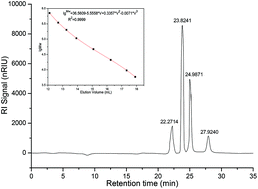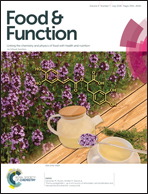Modulation of gut microbiota by mulberry fruit polysaccharide treatment of obese diabetic db/db mice
Abstract
Increasing evidence indicates that gut microbiota is an important factor in mediating the development of metabolic disorders, especially type 2 diabetes. Herein, we investigated the protective effects of polysaccharides from mulberry fruit on diabetic db/db mice. We observed an inhibition in the body weight increase, a decrease in the blood glucose levels, and an improvement in glucose tolerance. Furthermore, our data showed increased enzymatic activities as evidenced by parameters such as superoxide dismutase (SOD), glutathione peroxidase (GSH-Px), and catalase (CAT). In addition, high density lipoprotein cholesterol (HDL-C) increased, while total cholesterol (TC), triacylglycerol (TG), low density lipoprotein cholesterol (LDL-C), lipid peroxide content malonaldehyde (MDA), and free fatty acid (FFA) levels decreased, accompanied by the recovery from damage to the liver, kidneys and pancreas. Meanwhile, metformin and polysaccharide similarly shifted the abundance of the main gut microbiota, Bacteroidetes and Firmicutes, in diabetic mice toward levels observed in healthy mice. Especially at the genus level, the enrichment of some key bacteria like Bacteroidales, Lactobacillus, Allobaculum, Bacteroides, and Akkermansia was observed. Taken together, our findings suggest that polysaccharides from the mulberry fruit modulate gut microbiota, including enriching functional bacteria and reducing microbial diversity, which may contribute to their antidiabetic effects.

- This article is part of the themed collection: Around the Supermarket: Staple Foods


 Please wait while we load your content...
Please wait while we load your content...